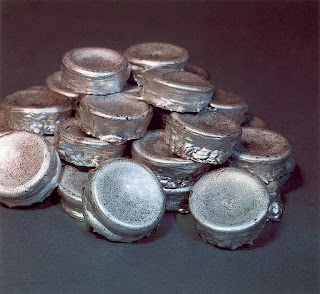- The chemical symbol for uranium is U and its atomic number is 92.
- It's the heaviest element to occur naturally in the universe. It was created in supernovae 6.6 billion years ago, according to the World Nuclear Association.
- Before Martin Klaproth officially discovered it, it had been found in Silver mines in the Czech Republic since the 1500s. As it was usually found when the silver vein ran out, the miners called it "pechblende" which means "bad luck rock".
- It was named after the planet Uranus, which had been recently discovered at the time.
- It's radioactive, which a French scientist called Henri Bequerel discovered in 1896 - in fact, he is credited with discovering radiactivity itself, after he left a uranium salt on a photographic plate in a drawer, and found it had emitted its own rays, fogging up the glass as sunlight would have done. It's also unstable, because it's so heavy. It sheds protons and goes through 14 transitions into other elements including radium and polonium, until it turns into Lead.
- The first use uranium was put to, in the 18th century, was colouring photographic film and even colouring glasses and dinner plates. The practice of colouring crockery with it was happening as recently as 1973.
- Thankfully, the human kidney can get rid of any uranium you might ingest under normal circumstances. Chances are you do, as it's present in trace amounts in seafood and root vegetables.
- Only one of uranium's three isotopes can trigger a nuclear chain reaction - that's uranium-235 which makes up only about 0.72 of a sample of uranium ore. Scientists in New Mexico in the 1940s, worked in secret to harness that power. Their work, which they nicknamed "tickling the dragon's tail" resulted in the atomic bomb that was dropped on Hiroshima in 1945.
- Uranium is solid at room temperature. It melts at 2,507 degrees Fahrenheit/1,135 degrees centigrade, and boils at 7,468 degrees Fahrenheit/4,131 degrees centigrade.
- It's the 48th most abundant element in rocks on Earth - 40 times more abundant than silver.
Golden Thread
Terry Kennedy is inexplicably and inexorably drawn to the small town of Fiveswood as a place to live and work after university. He is sure he has never visited the town before, but when he arrives there, it seems oddly familiar.
Fiveswood has a rich and intriguing history. Local legends speak of giants, angels, wolves, a local Robin Hood, but most of all, a knight in golden armour. Fiveswood's history also has a dark side - mysterious deaths blamed on the plague, a ghostly black panther, and a landslide which buried the smugglers' caves.
Terry buys an apartment in The Heights, a house which has been empty for decades, since the previous owner disappeared. Now he has finally been declared dead, developers have moved in and turned it into six flats. Terry has the odd feeling he has lived in this enigmatic house before. But that is not all. Since childhood, Terry has had recurring, disturbing dreams which have been increasing in frequency so that now, he has them almost every night. To his dismay, the people from his nightmares are his new neighbours.
Except, that is, for Eleanor Millbrook. She is refreshingly unfamiliar. After Terry saves her from a mysterious attacker, they become close. However, Terry's nightmares encroach more and more on his waking life, until they lead him to a devastating discovery about who he really is.
Available on Amazon:
Available on Amazon:
Paperback
Kindle


No comments:
Post a Comment